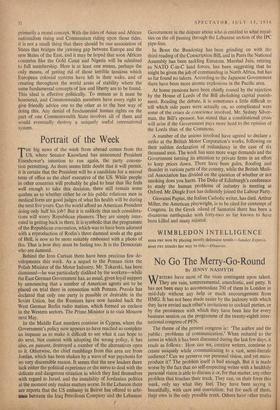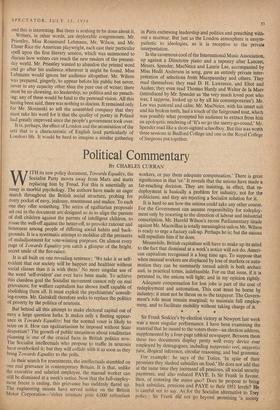No Go The Merry-Go-Round
BY JENNY NASMYTH WR1TERS have most of the vices contingent upon talent. They are vain, temperamental, anarchistic, and petty. It has not been easy to accommodate 760 of them in London in mid-July without any help or much encouragement from HMG. It has not been made easier by the jealousy with which they have envied each other's invitations to cocktail parties, or by the persistence with which they have been late for every business session on the programme of the twenty-eighth inter- national congress of PEN. and this is interesting. But there is nothing to be done about it.
Writers, in other words, are deplorable congressmen. Mr. Priestley, Miss Rosamund Lehmann, Mr. Wilson, and Mr. Elmer Rice the American playwright, each cast their particular spell upon the first literary session, which was summoned to discuss how writers can reach the new readers of the present- day world. Mr. Priestley wanted to abandon the printed word and go after his audience ,wherever it might be found. Miss Lehmann would ignore her audience altogether. Mr. Wilson was prepared, gingerly, to appear before his public but never, never in any capacity other than the pure one of writer; there must be no clowning, no leadership, no politics and no preach- ing; any of these would be fatal to the personal vision. All this having been said, there was nothing to discuss. It remained only for Mr. Slonimski to tell the assembled company that they must take his word for it that the quality of poetry in Poland had greatly improved since the people's government took over.
It is, perhaps, the effect of London and the atomisation of the arts that is a characteristic of English (and particularly of London) life. It would be hard to imagine a similar gathering in Paris eschewing leadership and politics and preaching with- out a murmur. But just as the London atmosphere is unsym- pathetic to ideologies, so it is receptive to the private interpretation.
In the cavernous cool of the International Music Association, up against a Directoire piano and a tapestry after Lancret. Messrs. Spender, MacNeice and Laurie Lee, accompanied by Miss Hedli Anderson in song, gave an entirely private inter- pretation of selections from Macspaunday and others. They read themselves; they read D. H. Lawrence, and Eliot and Auden; they even read Thomas Hardy and Walter de la Mare (introduced by Mr. Spender as 'the very much loved poet who was, I suppose, looked up to by all his contemporaries'). Mr. Lee was pastoral and calm; Mr. MacNeice, with his smart suit and his broken teeth, had a touch of the fairground tout, which was possibly what prompted his audience to extract from hid' an apologetic rendering of 'It's no go the merry-go-round.' Mr. Spender read like a short-sighted schoolboy. But this was worth three sessions in Bedford College and one in the Royal College of Surgeons put together.



































 Previous page
Previous page